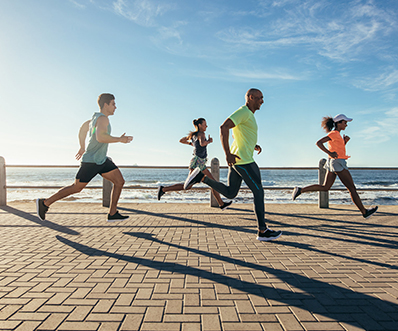SUBJ: thankful for exercise to boost immune function
SUBtitle: evidence for 500mg of vitamin C twice a day still justified
One of the best ways to increase healthspan is feeling gratitude. Another is to relax and enjoy eating. Happy Dia de Pavo.
SHORT NOTES: LPI conference notes, like how to boost immune function; children who get fish oil were sick 50% less and back to school faster; 500mg vitamin C twice a day still wise; up to 70% of people experience positive psychological growth from difficult times; Better quality diet predicted lower risk of all-cause and CVD mortality; Rockfish live more than 200 years; lots of studies confirming vigorous exercise is vital to long healthspan; psychological resilience and cognitive function harmed by inflammatory status; Sugar-Sweetened Beverage Consumption During Adolescence is harmful; lithium (150 mg/day) in the treatment regimen of bipolar disorder deserves reconsideration; high milk consumption was associated with higher cancer mortality, while fermented milk consumption was associated with lower cancer mortality; periodic fasting may hold potential to improve effectiveness of chemotherapy; Skeletal muscle adaptations to exercise are not influenced by metformin; lefties make up only about 10% of the population.
LONG NOTES:
LPI conference
1)Vitamin D and COVID-Vit D induces anti-viral responses in immune system, best with at least 400-1,000 up to 2,000 IU or more daily, vaccine more effective with vit D.
2) Immunity in the aging immune system https://www.youtube.com/watch?v=QQyEutMx634&t=508s
-17% of developed world over age 65, immune system decreases as we age, but varies dramatically in individuals, need vit D, E, B12, B6, folate, Zn, Cu, Se, Fe, Ca, but important to get optimum level, not too much or too little, e.g. vit E best at 200IU/day (3x more effective than 60 or 800 IU) (35% reduction in colds, flu, etc.), Zn 30 mg/day, wolfberry had great benefit, calorie restriction very effective lowering inflammation (CRP), fruits and veggies reduce weight gain during high fat diet, less inflammation, more T-cells,
3) Nutrition for critically ill patients-40% of critically ill are malnourished increasing hospitalization 40%, poor outcome, 60% increase in mortality, missing 10,000 Calories over 7 days can be fatal. Especially oxidative stress-need vitamin C, E, iron, selenium, lipoic acid, glutathione, (Int J Biochem Cell Bio 2007: 39:44), thiamine (100-200mg/day), copper, zinc, FLU REPLETION-3MG CU, 300MCG SE, 30MG ZN reduced pneumonia risk by 65%
4) Omega-3 fatty acids-EPA and DHA most impt, omega-6. (red meat) cause inflammation, omega-3 (fish, supplements) reduce inflammation, linear dose response up to 4g EPA/day, in cells replaces omega-6 with omega-3, 40% reduction in asthma in children of mothers taking fish oil supplements, great for people with Rheumatoid Arthritis, recovery from inflammation comes from EPA and DHA, esp arthritis, sepsis, plant omega-3s do not help, DHA > EPA, children who get fish oil were sick 50% less and back to school faster.
READER QUESTION: I saw a recent study from USC noting that participants who consumed supplemental Vitamin C had a higher risk of hardening of the arteries.
“People taking about 500 mg of vitamin C in supplements each day for a year showed a progression in carotid wall thickness that was 2.5 times greater than those who did not take a vitamin C supplement, whether they were men or women. And the higher the dose, Dwyer said, the greater the atherosclerosis progression. In another major study, The researchers found no evidence that vitamin C from food caused heightened atherosclerosis progression. “
What is you opinion or supplementing on Vitamin C?
ROC ANSWERS: How startling that study at USC is. If it increased 2.5 times in one year, then since I have been doing it for 40 years, I am amazed I do not have serious heart disease. As many major studies have found no harm or improved health with vitamin C, it is difficult to accept this result as conclusive. I have followed vitamin C research religiously, as has a Harvard professor, and evidence in toto seems consistent. But I will keep my eyes open for followup studies.
Research has found that up to 70% of people experience positive psychological growth from difficult times, such as a deeper sense of self and purpose, a greater appreciation for life and loved ones, and an increased capacity for altruism, empathy and desire to act for the greater good. https://www.uwhealth.org/news/the-surprising-benefit-of-going-through-difficult-times
Better quality diet predicted lower risk of all-cause and CVD mortality in Australian adults, while a more inflammatory diet predicted higher mortality risk. https://academic.oup.com/jn/advance-article-abstract/doi/10.1093/jn/nxab386/6427357?redirectedFrom=fulltext
Science pg 824 12 Nov ’21- Rockfish live more than 200 years. They are identifying which genes shared with humans may extend healthspan dramatically.
After a first manic episode, 1 year of randomized treatment with lithium (150 mg/day) was superior to that of quetiapine, suggesting the importance of having lithium in the treatment regimen. Given the highly recurrent and progressive course of bipolar disorder sometimes even in the face of conventional treatment, the role and enhanced use of lithium deserves reconsideration. https://www.nature.com/articles/npp2017238#ref-CR55
Our results imply that high milk consumption, especially high/whole-fat milk, was associated with higher cancer mortality, while fermented milk consumption was associated with lower cancer mortality, and this was particularly evident in females. https://academic.oup.com/advances/advance-article-abstract/doi/10.1093/advances/nmab135/6425730?redirectedFrom=fulltext
Available data show that periodic fasting, a form of intermittent fasting, may hold potential to improve effectiveness of chemotherapy, decrease treatment related side effects and cancer promoting factors such as insulin, while ameliorating treatment related decreases in quality of life and daily functioning. https://academic.oup.com/advances/advance-article-abstract/doi/10.1093/advances/nmab132/6425731?redirectedFrom=fulltext
Skeletal muscle adaptations to exercise are not influenced by metformin treatment in humans: secondary analyses of two randomised, clinical trials
Lefties make up only about 10% of the population.


